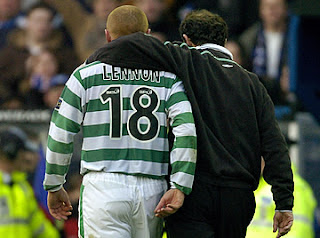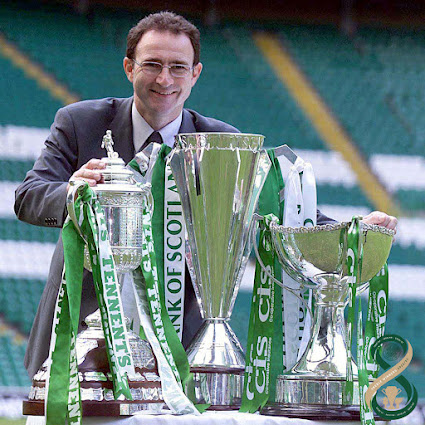Something
inside so strong
As I was driving through Glasgow’s east end
today, the car radio was playing a programme called ‘Soul Music.’ Despite the
name, the show looks at the emotional impact of music of various genres on
people. Today’s programme was about Labi Siffre’s song ‘something inside so
strong.’ Siffre wrote the song in 1984 after watching a documentary on
apartheid South Africa. He also stated that some of the lyrics reflected his
life growing up as a gay man in less kind times. As various people spoke of the
emotional impact of the song on their lives, I was surprised to hear a Scottish
voice talking about the song and what it meant to him as a Celtic supporter.
Those of you who follow Celtic will know of the
persecution of Neil Lennon during his time as a Celtic player and manager. The
abuse he suffered in Scotland ranged from moronic barracking at certain
stadiums, physical assault in the street and on the touchline, as well as
receiving bullets and bombs in the post. Add to this the day-to-day low-level
hassles which made even popping out for a pint a challenging experience. It
remains a disgrace that anyone was treated in that manner in our country. Mark
Cameron of the Arthur McKenna, Lochgelly CSC said on the radio show….
‘It has been a cult song for sections of the
Celtic support for years. It’s a powerful, emotional song which has real
meaning for sections of the support. I think because parts of the support have
been marginalised in society. Something inside so strong means a lot to Neil as
it epitomised his life story. He has been the subject of racist and sectarian
abuse both her in Glasgow and in his native Northern Ireland. In 2008 he was attacked while out socialising
in the west end of Glasgow, then he was also sent parcel bombs in the post. In
2011 he was attacked at his work at Tynecastle Park.’
The song really resonated with Celtic fans at
that time. Celtic played it before a game with Motherwell and Neil must have
taken great comfort from hearing 60,000 fans singing it in support of him.
Journalist Graham Spiers hit the nail on the head when musing on why Neil
Lennon was singled out for the abuse he endured in Scotland…
‘Lennon embodies the very thing that some
residual bigots in Scottish society and Scottish football cannot stand: a
visible, vocal and successful Irish Catholic who doesn’t shirk from anything.
This is too much for some to bear.’
Lennon’s time as a player at Celtic came at time
when Martin O’Neill was building what some consider to be the best Celtic side
since the Stein era. His 7 years at the club saw him win 5 titles, 4 Scottish
cups and 2 league cups. He was also a part of the Celtic side which made it to
their first European final in 33 years during that never to be forgotten run to
Seville in 2003. All through those years, he lived with the pressure of being a
‘hate’ figure to some in Scottish football. He was clear about why he was
picked on. There have been other players in Scottish football as annoyingly feisty
as Lennon; one can think of Strachan, Souness or even Scott Brown, but none of
them received the level of sheer vitriol Lennon did. He himself said in later
years, why he thought this was…
‘Everyone tries to skirt around it but that’s the
basis of it, has been since 2000. The first day I stepped onto Windsor Park
(Belfast) as a Celtic player I was booed every time I touched the ball having
previously played 36 times and had nothing. But with my association with Celtic
being high profile, there’s no doubt in my mind that that was behind it and
it’s what you want to call it; you call it sectarianism here in Scotland, I
call it racism. If a black man is abused, you are not just abusing the colour
of his skin, you are abusing his culture, his heritage, his background. It’s
the exact same when I get called a Fenian, a pauper, a beggar, a tarrier by
these people with their sense of entitlement and superiority complex. All I do
is stand up for myself.’
Lennon, of course, managed Celtic too and brought
further success to the club, leading them to 5 more titles, 4 Scottish Cups and
1 league cup. His entire career at Celtic as a player and manager saw him help
the club to 10 titles, 8 Scottish Cups and 3 League cups. He also got the side
to the last 16 in the Champions league and gave the fans some memorable nights
in Europe. Yet, there lingers still among some Celtic fans a sour taste about
the events of the so called ‘covid season’ or 2020-21. Lennon was let down by
his players, that’s for sure. Playing in empty stadiums seemed to be something
of a leveller when it came to Celtic and Rangers deservedly won their first
title in a decade.
The abuse Neil Lennon received from a minority of
Celtic fans in that ‘Annus horribilis’ of 2021 will, I’m sure make some of them
blush when they look back on it. Football is a results driven business and
there is no doubt that Celtic were awful that year. There were extenuating
circumstances with the world-wide pandemic, expensive signings not showing up
well and injuries, but the manager is always likely to be the fall guy. He’s
the lightening rod who takes the flak from fans when things aren’t going well.
The fact that Celtic totally blew a chance to win ten in a row compounded the
misery of that season and somewhere amid all the hysteria some went overboard
and displayed a level of petulance that is born of an unhealthy sense of entitlement.
I recall Jock Stein’s last year at Celtic in
1977-78. Celtic had a dreadful season, finishing 5th in
the league, going out of the cup to second tier Kilmarnock and failing to
qualify for European football. People accepted that it was a bad year but
recognised that injuries to key players (McGrain & Stanton) as well as
Dalglish moving on in the pre-season contributed to the forgettable displays
that year. No one questions the legacy or legendary status of Jock Stein based
on that one season. Neil Lennon was clearly no Jock Stein, as he himself would
admit, but his time at Celtic seems to be remembered more by some for failing
to make it ten in a row, than for his many achievements at the club. He
contributed to Celtic winning 21 major trophies and that, in my eyes, is
deserving of respect.
Did he make mistakes as manager? Yes, you could
argue he should have stepped aside sooner in that dreadful 2020-21 season, but
as this pugnacious Irishman demonstrated on many occasions, he was never one for
backing down or walking away from a challenge. I hope in years to come that the
vast majority of Celtic fans will see what he achieved at Celtic and what he
endured on and off the field to do so. As a fan, player and manager, he gave
his all for the club. We can ask no more than that.
He stood up to the haters in society and in doing so represented Celtic with fire and determination. Like the club he loved, he faced
obstacles that had little to do with football and succeeded despite them all.
Like all Celts, he’d nod at the words of the song I heard on the radio today…
‘Brothers
and sisters, when they insist, we’re just not good enough
Well, we know better, just look them in the eyes and say
We’re gonna do it anyway, we’re gonna do it anyway.’








.jpg)




.jpeg)
.jpeg)
